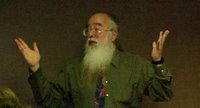 Today, I attended the Buchanan Seminar for school and heard Loren Lomasky (a philosophy professor from the University of Virginia) speak about justice, rights, reciprocity and ask us questions about how to apply these concepts in helping the world’s poor. Something interesting he said today was that in discussions philosophers have had over the years, they seem to focus on moral failings of the rich as the source of misery in developing parts of the world and seem to miss the fact that most of the injustices taking place are within the borders of these nations.
Today, I attended the Buchanan Seminar for school and heard Loren Lomasky (a philosophy professor from the University of Virginia) speak about justice, rights, reciprocity and ask us questions about how to apply these concepts in helping the world’s poor. Something interesting he said today was that in discussions philosophers have had over the years, they seem to focus on moral failings of the rich as the source of misery in developing parts of the world and seem to miss the fact that most of the injustices taking place are within the borders of these nations.This lead to one of my favorite quotes of the day:
"Political actors have particular expertise in despoiling populations."Many of the problems in places like Haiti and parts of Africa that have caused a failure of development result because the politicians and people with power ignore the rights of their people to justice, liberty and property. Without the protection of these rights BY their countries, nothing the West does will bring them out of poverty.
Lomasky defined liberty as the non-interference of rights of one individual by another. He went on to say that most foreign aid the West tries to give to the rest of the world violates this notion of liberty.
During the seminar, Lomasky used a term that I hadn’t heard before called the “Samaritan’s Dilemma”. This refers to the problem people face when trying to help the poor. Oftentimes, our efforts actually serve to give those we’re trying to help incentives to continue in behavior that keeps them in poverty. I found this article on the Acton Institute to help explain it further. Here’s an excerpt:
Read the whole article!On the face of it a soup kitchen sounds like an unequivocal good. But this requires deeper examination. The first thing we must do, if we are serious in our desire to help the poor better their lot, is to consider the full effect of the programs we organize in their name.
The danger of private charity is that it does not make the recipient part of the division of labor. Therein lies the Samaritan's dilemma: The expectation of charity can lead people to behave in ways that keep them in poverty; their breaking free sometimes requires our withholding help. Among religious leaders, when we talk of charity, we often speak of the sanctity of the human person. But in our efforts to help the children of God, we ought not overlook the virtue of work. We ought not overlook the dignity that is earned when a person puts his labor to good use. In the Judeo-Christian tradition, sloth is a sin. God gave Adam and Eve the Earth and its wonders as a gift, but He expected them to mix their labor with the resources He provided.
When charity creates a disincentive for an able-bodied person to work, it leads this person down the wrong path. It encourages indolence. Real work provides the individual with the vehicle for a productive and virtuous life. It gives a person self-esteem and a role to play in society.
When government welfare is scaled back, as it surely will be, private charity will be required to an even greater extent. But we will need to be careful about which charities we support. How to know the difference? Bad charity is characterized by the failure to look deeply enough to discover the structural and moral causes of poverty. Men and women of faith will be called to concern themselves not just with the material needs of poor individuals but with their spiritual needs as well.
After his 2-hour talk, we had questions and answers for about another hour and got into some great discussions. We have a second meeting tomorrow.
After the seminar was finished, one other student and I had the privilege to go out to dinner at a local Indian restaurant with Prof. Lomasky and David Levy (GMU economics professor). The food was excellent and the conversation even better!
Looking forward to day two tomorrow!
Questions: Is there anything individuals in the West can do to help places like Haiti, Africa and Asia to develop economically? Are we concerned about their freedoms? Do you agree with the definition of liberty as non-interference? What role does liberty play in development? Why are philosophers and activists so prone to condemn the West in their treatment of third-world countries, but seem to turn a blind-eye to the injustices perpetuated by the governments of these nations?
No comments:
Post a Comment